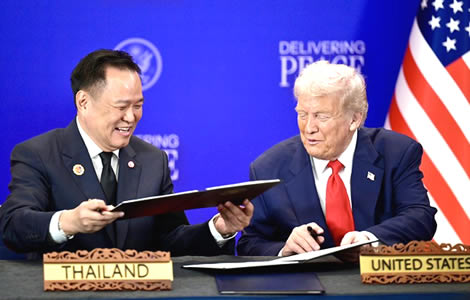Trump brokers landmark peace as Thai PM Anutin and Cambodia’s Hun Manet sign the ‘Kuala Lumpur Accords’ in Malaysia. The US-backed deal ends deadly border clashes, orders troop pullbacks, mine clearance, and cracks down on cross-border scam networks, while boosting ASEAN unity as a peace mediator.
US President Donald Trump on Sunday presided over a landmark treaty between Thailand and Cambodia, dubbed the ‘Kuala Lumpur Accords’. The pact lays out a clear framework to restore peace and stability after months of deadly border clashes. It creates an ASEAN observer force to monitor compliance, beginning with troop withdrawals and mine clearance. Cambodia must also crack down on scam operations targeting Thailand, while Thailand will release 18 Cambodian prisoners of war. A joint border mapping commission will use advanced LiDAR technology to finalise boundaries. Before the signing, a visibly tense Thai Prime Minister Anutin Charnvirakul went online to reassure nationalists that no sovereignty had been compromised. Trump hailed the deal as a “triumph of diplomacy” that could save countless lives and bring lasting calm to the region.

President Donald Trump on Sunday declared victory for peace in Southeast Asia, announcing what he called a historic agreement between Thailand and Cambodia. The deal, signed at a high-profile ceremony in Malaysia, seeks to end years of tension and border violence between the two neighbours. Trump called it a “triumph of diplomacy” and said it proved that “peace through strength works.”
The signing took place at the Kuala Lumpur Convention Centre during a regional summit hosted by Malaysian Prime Minister Anwar Ibrahim, who also served as ASEAN Chair. Trump stood beside Thai Prime Minister Anutin Charnvirakul and Cambodian Prime Minister Hun Manet, with Anwar signing as witness.
The ceremony, packed with international media, marked the culmination of months of shuttle diplomacy, pressure, and persuasion.
Trump hails Kuala Lumpur Peace Accords as a faith leap to restore stability and trust between neighbours
“This is something a lot of people said couldn’t be done,” Trump told reporters afterwards. “We saved maybe millions of lives by preventing a regional war.” He said the “Kuala Lumpur Peace Accords” would stabilise a volatile border and open the door for trade, investment, and lasting friendship.
Under the agreement, both sides must withdraw troops and heavy weapons from the conflict zone within sixty days. They must also remove land mines and clear unexploded ordnance.
Furthermore, both countries will cooperate in tackling cross-border scams and cybercrime, which have become a major source of friction. In addition, an ASEAN Observer Team will monitor the ceasefire. It will include personnel from several Southeast Asian nations, ensuring compliance and transparency.
Thailand also agreed to release eighteen Cambodian prisoners of war. In return, Cambodia pledged to halt propaganda and cyber-scam operations that target Thai citizens. “It’s a fair, balanced, and necessary step toward normal relations,” said Trump. “The world should take note that diplomacy still works.”
Recent deadly clashes push Trump to pressure both sides toward a lasting and verifiable peace declaration
The peace accord comes following a five-day border clash earlier this year that killed more than forty people and displaced thousands. At the height of the fighting, U.S. satellites detected artillery movements on both sides of the frontier. After that, Trump then threatened to block trade deals with both governments unless the violence stopped. Within a week, the two nations announced a temporary ceasefire.
Still, tensions remained high. For instance, Thailand accused Cambodia of illegal logging and encroachment, while Cambodia claimed Thai forces had fired first. Both sides engaged in psychological warfare, using propaganda broadcasts and loudspeaker “ghost sounds” to demoralise the other’s troops. Nationalist influencers on social media in both countries fanned the flames.
Because of this, Trump’s team pushed hard for a formal document that could hold. He called it “a peace deal.” However, the Thai government preferred the term “declaration,” reflecting domestic caution over sovereignty issues.
Prime Minister Anutin addressed that distinction directly. “We are not surrendering our territory,” he said. “This statement is a guideline for peace, not a treaty that disadvantages Thailand.” He stressed that the deal would not affect border demarcation and that the Cabinet had already approved its contents.
Anutin reassures citizens on sovereignty as LiDAR mapping and mine clearance headline peace obligations
Before leaving for the signing, Anutin livestreamed on Facebook to reassure Thai citizens. He spoke from Kuala Lumpur, saying, “Thailand is a peace-loving nation, but we are not afraid to fight.” He insisted that reports about Thailand accepting the controversial 1:200,000 border map were false. “We never agreed to that map,” he said. “New technology like LiDAR will replace outdated methods.”
Anutin explained that the accord contained four main obligations for Cambodia. First, the withdrawal of heavy weapons. Second, the clearance of mines and unexploded ordnance. Third, cooperation in cracking down on scam operations. Fourth, agreement on joint management of overlapping areas. “All four points must start with Cambodia,” he said. “Once progress is visible, Thailand will move forward in good faith.”
To show goodwill, Thailand will release the eighteen detained Cambodian soldiers once the ASEAN observers verify troop withdrawals. “We want peace with dignity,” Anutin said. “But it must be peace built on trust, not weakness.”
Trump praised both leaders for their “tough negotiations and courage.” He said, “These two men faced down extremists in their own countries and chose peace instead of conflict.” He added that the agreement would lead to “a brighter future for millions living near the border.”
Trade and critical minerals deals highlight U.S. regional strategy as Malaysia praised for mediation role
The U.S. also used the event to announce two parallel deals. The first is a “major trade deal” with Cambodia. The second is a “critical minerals partnership” with Thailand, aimed at securing rare earth supply chains for U.S. industries. Trump did not provide full details but said both deals would “reward stability and strengthen America’s friends.”
Malaysian Prime Minister Anwar Ibrahim described the accord as “a victory for ASEAN diplomacy.” He said Malaysia’s role as host and mediator showed that “regional unity can deliver peace when global powers cooperate, not compete.”
The timing of the signing was delicate. The ceremony was moved earlier in the day following the death of Her Majesty Queen Sirikit, the Queen Mother of Thailand, on Friday at age ninety-three. Trump offered condolences to Anutin during their bilateral meeting. “Today, we honour her memory by bringing the blessing of peace to the nation she dearly loved,” he said.
Rising nationalism and online hate threaten fragile peace as critics face intimidation and digital harassment
For Thailand, the agreement is politically risky. Nationalist groups at home have already accused the government of bowing to foreign pressure. Over recent weeks, critics of the peace process have faced harassment.
Senator Angkhana Neelapaijit and Human Rights Watch researcher Sunai Phasuk both sought police protection after receiving online threats. Their only “crime” was condemning psychological warfare tactics used against Cambodian civilians.
Meanwhile, Cambodian social media has also turned toxic. Senate President Hun Sen warned citizens not to post videos burning Thai goods after one clip went viral. Several Thai media outlets were forced to restrict comments after users exchanged insults about Queen Sirikit’s death. This growing hostility has highlighted the biggest challenge of all — public sentiment.
Analysts say the real battle is now internal. “The conflict is no longer just Thai versus Cambodian,” said a Bangkok-based scholar. “It’s moderates versus ultranationalists inside each country.” In Thailand, far-right influencers have accused Anutin of betrayal. In Cambodia, critics of Hun Manet have warned against “trusting Bangkok.”
Leaders pledge lasting reconciliation as ASEAN observers prepare to monitor de-escalation and border rebuilding
Despite the backlash, the two leaders pressed forward. “This statement marks a concrete step toward peace,” Anutin said during the ceremony. “It will lay the foundation for normalisation and reconciliation.” Hun Manet agreed, calling the deal “a bridge toward a shared future.”
The official document, signed in four copies, contains eight major points. It reaffirms the July ceasefire, prohibits the use of force, and establishes the ASEAN Observer Team. It mandates military de-escalation, humanitarian demining, and confidence-building measures. It also commits both nations to resolving border issues peacefully through the General Border Committee and the Joint Boundary Commission. Once the steps are completed, both sides will formally end hostilities.
The declaration closes by thanking Malaysia and the United States for their roles. “We express deep appreciation to President Donald J. Trump for fostering normalisation of bilateral relations,” the document reads.
Trump frames deal as proof of leadership. Observers warn challenges remain for lasting regional harmony
Trump, speaking last, framed the deal as proof of his foreign policy vision. “This is how peace is made,” he said. “Not by endless talk, but by leadership, courage, and results.” He reminded the audience that “peace through strength” had been his principle since his first presidency. “We don’t start wars — we end them.”
For many observers, Sunday’s signing was both symbolic and strategic. Significantly, it allowed Trump to showcase American influence in Southeast Asia while reasserting Washington’s role as a global mediator. It also strengthened ties with two nations seen as important to regional security and economic corridors.
Trump to oversee groundbreaking new deal between Thailand and Cambodia on Saturday to map border
Yet the challenge ahead remains steep. Both governments must implement the deal amid nationalist opposition and mutual suspicion. The ASEAN observers must maintain credibility. Local militaries must stay disciplined. Above all, both societies must reject the rhetoric of hate.
As the cameras flashed and the leaders clasped hands, it was clear the journey was far from over. Trump called it “the dawn of a new era.” Anutin called it “peace with dignity.” Hun Manet called it “a new start.”
Nonetheless, beyond the handshakes and the headlines, peace will depend on what happens next. Certainly, not just along the border, but within each country’s heart. The guns may be silent for now, however, the fight for peace, truth, and tolerance has only begun.
Join the Thai News forum, follow Thai Examiner on Facebook here
Receive all our stories as they come out on Telegram here
Follow Thai Examiner here
Further reading:
Trump to oversee ground breaking new deal between Thailand and Cambodia on Saturday to map border
High powered, secretive meeting chaired by PM agrees robust action against Cambodian networks
Thailand and Cambodia face danger from ‘Dragon Head’ the Chinese mafia leader behind the scams
Cyber police and Money Laundering agency seek UK and US co-operation targeting Cambodian networks
United States, South Korea and United Kingdom act against Cambodian scam industry with Thai tie-ins
Ben Smith affair & allegations of links to Cambodian scam centres continues to rage in parliament


















